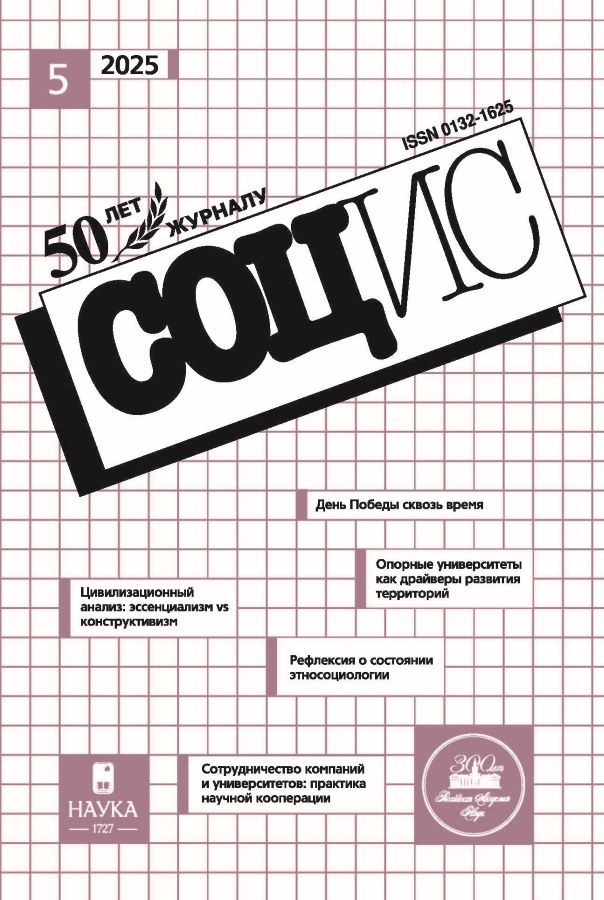Ctory day through the eras: memory and commemorative practices
- Autores: Andreeva A.S.1, Omel’chenko E.L.1
-
Afiliações:
- HSE University
- Edição: Nº 5 (2025)
- Páginas: 3-13
- Seção: THE 80th ANNIVERSARY OF THE VICTORY
- URL: https://rjsvd.com/0132-1625/article/view/687283
- DOI: https://doi.org/10.31857/S0132162525050017
- ID: 687283
Citar
Texto integral
Resumo
The article focuses on the memory of the Great Patriotic War and the victory in it, as well as the practices of commemoration associated with May 9, across the eras of Soviet and Russian history. With the passing of the generation witness of the memory of the Great Patriotic War moves from personal to collective one, and the issue of passing on memory to younger generations becomes relevant. The article uses data from personal diaries of the Prozhito corpus from 1946 to 2012, as well as two empirical projects in which the Centre for Youth Studies team studied the sociopolitical context of growing up, local identity, and patriotism of millennials (18–43 years old) from large Russian cities were studied through in-depth semi-structured interviews. Being the central event of the collective memory of Russians, the Great Patriotic War becomes one of the national identity pillars. Based on the data, we conclude that the memory of the Great Patriotic War and the victory in it remains an axis of solidarity between generations and is transformed over time, as the importance of passing on memory through family and vernacular commemorative practices increases. Victory Day is associated with an entire era in the life of the country, city, and family. Perceiving the Great Patriotic War and the victory in it as an emotionally charged and personally experienced event, young people nevertheless have a critical attitude towards the use of this memory as a tool for controlling patriotic feelings and civic affiliation.
Palavras-chave
Texto integral
Sobre autores
Anastasiia Andreeva
HSE University
Autor responsável pela correspondência
Email: as.andreeva@hse.ru
PhD Student, Research Assistant, Centre for Youth Studies
Rússia, St. PetersburgElena Omel’chenko
HSE University
Email: eomelchenko@hse.ru
Dr. Sci. (Soc.), Prof., Head of the Center for Youth Studies
Rússia, St. PetersburgBibliografia
- Andreeva Yu. V., Omelchenko E. L. (2017) What remains in family history: memory of the Soviet through the conversation of three generations. Sotsiologicheskie issledovaniya. [Sociological Studies]. No. 11: 147–156. (In Russ.)
- Assmann A. (2006) Der Lange Schatten der Vergangenheit. Erinnerungskultur und Geschichtspolitik. Munich: C. H. Beck.
- Bordyugov G. (2010) October, Stalin, Victory. The cult of anniversaries in the space of memory. Moscow: AIRO-XXI. (In Russ.)
- Brown D. (2015) Performative memory: celebration of Victory Day in Sevastopol. Neprikosnovennyy zapas [Emergency supply]. No. 101(3): 150–167. (In Russ.)
- Brunstedt J. (2021) The Soviet Myth of World War II: Patriotic Memory and the Russian Question in the USSR. Cambridge: Cambridge University Press.
- Danilova N. (2015) The Politics of War Commemoration in the UK and Russia. Houndmills, UK: Palgrave Macmillan.
- Ferretti M. (2005) Irreconcilable memory: Russia and war. Notes on the fields of the dispute on a burning theme. Neprikosnovennyy zapas [Emergency supply]. No. 40–41 (2/3): 76–82. (In Russ.)
- Halbwachs M. (2005) Collective and historical memory. Neprikosnovennyy zapas [Emergency supply]. No. 40–41 (2/3): 8–27. (In Russ.)
- Krote B., Paletschek S. (2009) History Goes Pop: Zur Repräsentation von Geschichte in populären Medien und Genres. Bielefeld: Transcript-Verlag.
- Lane C. (1981) The Rites of Rulers: Ritual in Industrial Society; The Soviet Case. Cambridge: Cambridge University Press.
- Makarova L. V. (2015) Great Patriotic War: What remains in personal memory? Sotsiologicheskie issledovaniya [Sociological Studies]. No. 11: 107–114. (In Russ.)
- Melnikova E. (2017) Reviewed by Aleida Assman. Laboratorium: Russian Review of Social Research. No. 9(2): 169–177. (In Russ.)
- Olick J. K. (2007) The Politics of Regret: On Collective Memory and Historical Responsibility. New York: Routledge.
- Omelchenko E. L., Lisovskaya I. V. (2022) Youth as a Barometer of the Future? The Youth Agenda in Contemporary Russia as Viewed by Youth Policy Experts. Monitoring obshchestvennogo mneniya: ekonomicheskie i social’nye peremeny [Monitoring of Public Opinion: Economic and Social Changes]. No. 2: 66–92. (In Russ.)
- Oushakine S. A. (2013) Remembering in Public: On the Affective Management of History. Ab Imperio. No. 1: 269–302.
- Radaev V. (2019) Millenials: How Russian society is changing. Moscow: HSE Publishing House. (In Russ.)
- Santino J. (2001) Signs of War and Peace: Social Conflict and the Use of Public Symbols in Northern Ireland. New York: Palgrave.
- Tumarkin N. (1994) The Living and the Dead: The Rise and Fall of the Cult of World War II in Russia. New York: Basic Books.
- Welzer H. (2005) History, memory and modernity of the past. Memory as an arena of political struggle. Neprikosnovennyy zapas [Emergency supply]. No. 40–41 (2/3): 28–35. (In Russ.)
- Zdravomyslova E. A., Temkina A.A. (2002) Crisis of masculinity in late Soviet discourse. In: Oushakine S. A. (ed.) On masculinity. Moscow: New Literary Review: 432–451.
Arquivos suplementares










